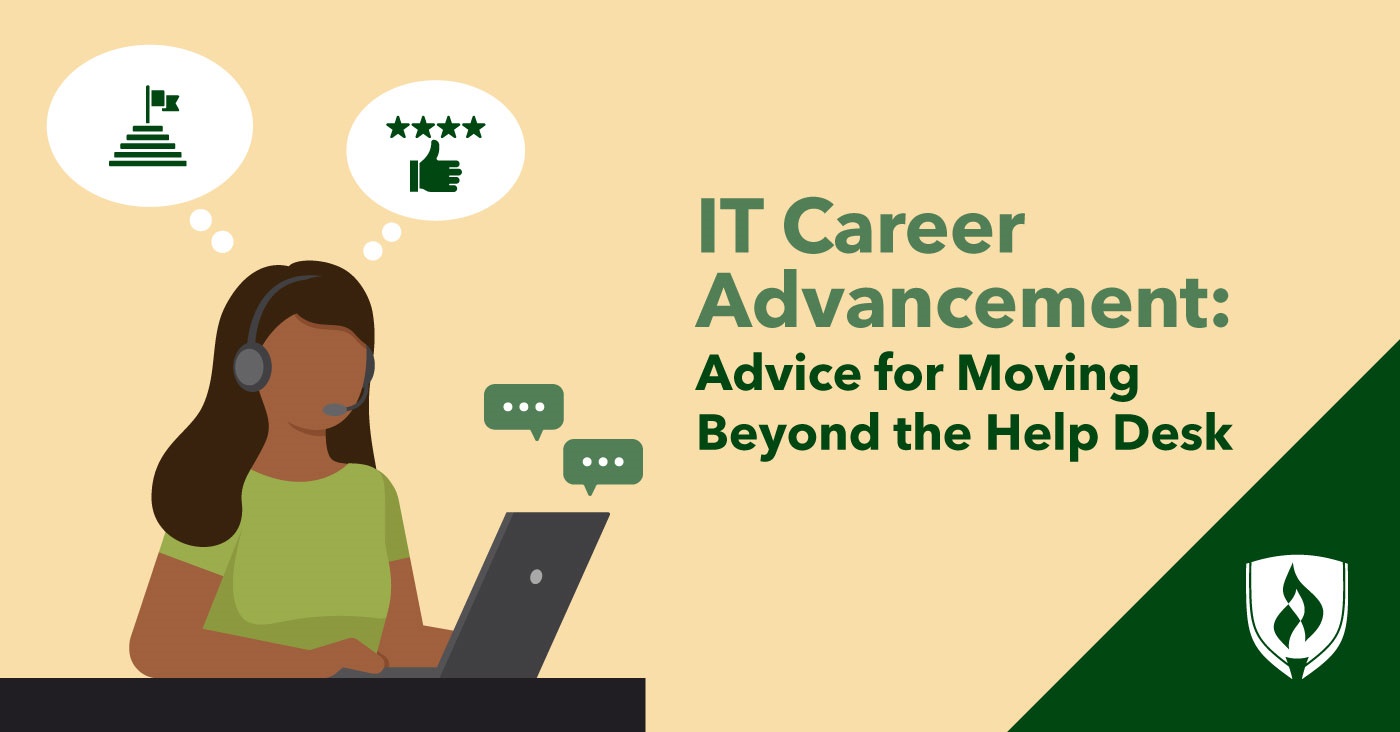
Working the IT help desk is a solid way to get your start in the technology field. Your help desk experience has given you valuable practice working on a team, communicating technical information to customers and, of course, working with the latest tech tools.
Lately you’ve been feeling the itch to move on to something more. But when it comes to information technology career advancement, you’re not completely sure of what your options are from here—or how to get started pursuing them.
While plotting a course for your future might seem daunting, you’re certainly not at a bad starting point. An IT help desk role can provide a lot of stability and serve as a great launching point for other tech careers. Read on to learn more about your future career potential and the next steps you can take to make your move.
Common career options beyond the help desk
First things first, you might be wondering what types of tech careers are available to you as someone with help desk experience. You can leverage your help desk experience into a variety of more advanced technology roles depending on your interests.
“The great thing about working in a help desk role is the wide range of technologies that you work with, which makes you a natural fit for a wide range of roles in the next phase of your career,” says Iyana Garry, former help desk worker and current IT and security analyst at Thrive Global.
Of course, some roles lend themselves more naturally to advancement beyond the help desk than others. Brandon Sheehy, former help desk worker and current software developer, finds that system administrator roles are often a natural fit for those ready to leave the IT help desk. “It advances the technician past end-user support into the management of servers, vendor software, large swaths of desktops and/or networks,” Sheehy says. He notes that many system administrators still have a support role to fill, but it’s typically on a larger scale rather than troubleshooting with a single user.
While by no means exhaustive, these are a few other technology roles you may have on your radar for advancement:
- Network administrator
- Cybersecurity specialist
- Software engineer
- Cloud computing engineer
- IT manager
- System administrator
6 Steps that can lead to IT career advancement
Now that you know what careers you can set your sights on, you need to learn how to get there. These are tried-and-true strategies our former IT help desk workers have used to leverage their IT experiences into more advanced careers.
1. Go above and beyond in your current role
Advancing within your own company can be an appealing option. One of the best ways to get the attention of supervisors is to go above and beyond in your help desk role. “Show initiative at your job. If you have the freedom, put in the extra effort to solve tough problems without escalating them too quickly,” Sheehy says.
Of course, this isn’t a magic solution that will have you landing a promotion next week. If you consistently go above and beyond, however, you’ll be in a good position to talk to your manager about advancement opportunities in the future. “If there's one thing sysadmins will notice and appreciate, it's help desk technicians who take support issues off their hands. That's going to open the door to advancements within your organization,” Sheehy says.
2. Gain experience outside the workplace
Of course, you may want to expand your skill set beyond what’s available to you in your help desk role. If that’s the case, you may want to spend time after hours assigning yourself projects and building skills in other areas that interest you.
“Create your own home lab, or offer to contribute to open source software in order to gain experience in the field that you want to work in,” Garry says. The work may not be paid, but it will show hiring managers that you’re serious about taking your skills to the next level—and it will help give you the portfolio to prove it.
3. Show what you know
Whether you want to advance in your current organization or seek employment elsewhere, you’ll have to prove to hiring managers that your help desk experience has built up over time. Garry recommends tracking all the help desk tickets you’ve worked on and gathering them in one place. Then you can sort through them to find relevant examples of experience with the type of work you’re hoping to do in the future.
“For instance, if I want to work in network administration, I’d have a document of all the help desk tickets I worked on that are related to networking,” Garry says. This will come in handy as a way to show how your skills have developed rather than asking hiring managers to take your word for it.
4. Highlight your soft skills
Technical skills aren’t the only thing that matters in more advanced tech roles. In fact, soft skills like strong communication can be even more important for those who are managers or leaders in a tech department.
Luckily, your time gaining experience at the help desk has given you soft skills in spades. You’ve had on-the-ground practice communicating technical information in an easy-to-understand way, growing in patience and learning to work together with a team. Be sure to highlight these soft skills as you pursue a higher-level position—you already have a leg up on those who may be fresh from school without any real-world experience under their belts.
5. Get certified
Certification is another simple way to boost your skills and show that you’re serious about advancing in your career. “Find what area interests you, and pursue those certifications,” Sheehy says. “You can find certifications in networking, Linux® server administration, Microsoft® technologies, database administration, etc.”
Because there are so many professional certifications to choose from, it’s best to have an idea of what type of technology career you’d like to advance into. Then you can focus your effort on certifications related to those skill sets. While you certainly can pick and choose individual professional certifications to pursue independently, at Rasmussen University, you have the option to complete an academic certificate program that can help prepare you professionals certifications—all while earning course credit.
Check out the links below to learn more about the technology-focused Certificate options at Rasmussen University:
6. Take your education to the next level
Your IT help desk experience can be a strong foundation for career advancement. However, it may not be enough to qualify you for the job title you’re after. The Bureau of Labor Statistics (BLS) shares that for roles such as systems administrator, information security analyst and software developer, most employers require a Bachelor’s degree in information technology or a related field.1
Earning a Bachelor’s degree will build upon your existing experience through relevant courses like IT Systems Analysis and IT Operations Management. With the combination of both education and help desk experience on your resume, you’ll have the potential to be in a strong position as you move toward the next stage of your career.
From the IT help desk and beyond
There’s no single path to information technology career advancement—but as you can see, there are plenty of steps you can take to leverage your help desk experience into a higher-level tech career. Now that you have a foothold in the industry, plotting a course to your next role should be a little easier.
If rounding out your education credentials looks to be part of your plan for pursuing career advancement, you’ll want to explore the Certificate options above or the Information Technology Management Bachelor’s degree page to learn more about your options at Rasmussen University.
Related Articles:
- IT Job Titles: Exploring Some of the Most Sought-After Roles in America
- Do You Have What it Takes to Be a Freelance Programmer?
- 6 Perfect People-Person Jobs in Tech
- What is a Hackathon? A Newbie's Guide to Collaborative Coding
- The Ultimate Holiday Gift Guide for Tech Pros
1Bureau of Labor Statistics, U.S. Department of Labor, Occupational Outlook Handbook, [May, 2021] https://www.bls.gov/ooh/computer-and-information-technology/home.htm. Information represents national, averaged data for the occupations listed and includes workers at all levels of education and experience. This data does not represent starting salaries. Employment conditions in your area may vary.
Linux is a registered trademark of Linus Torvalds.
Microsoft is a registered trademark of Microsoft Corporation.




